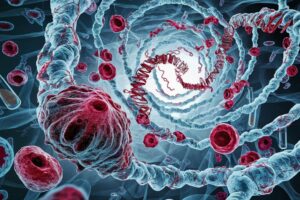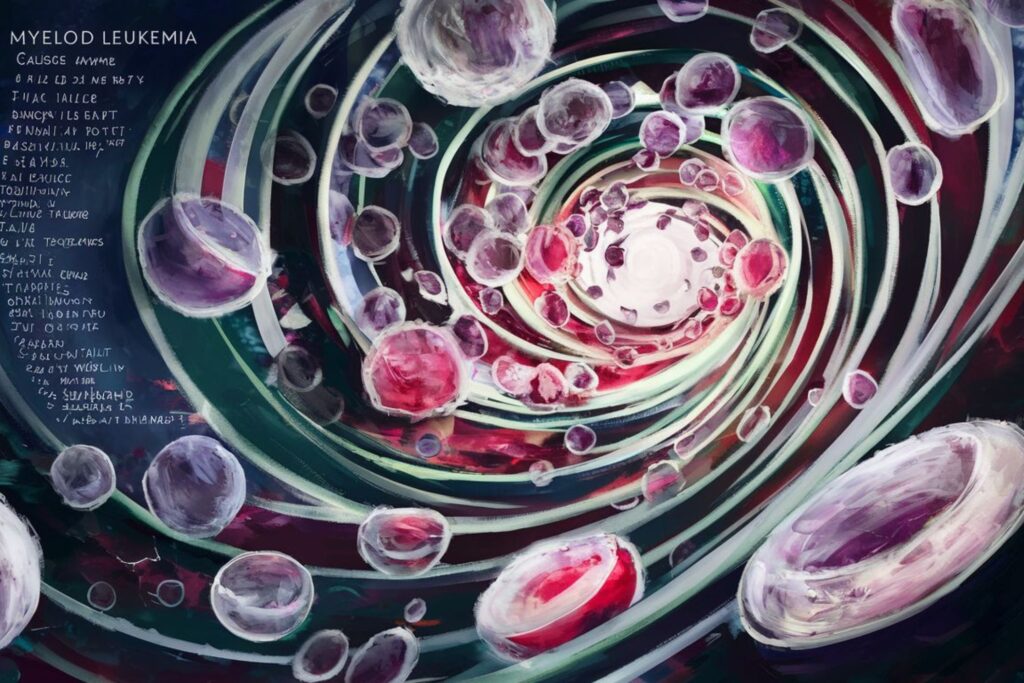Understanding the Genetic Factors of Myeloid Leukemia and the Emerging Treatments
Myeloid leukemia is a type of blood cancer that arises from genetic mutations in the bone marrow cells responsible for producing red blood cells, platelets, and white blood cells. Understanding the genetic factors underlying myeloid leukemia is crucial for both diagnosis and treatment. In recent years, advancements in genetic testing technologies have revolutionized the way we approach this disease, allowing for more personalized and targeted therapies.
This article delves into the genetic landscape of myeloid leukemia, explores the emerging treatments that specifically target these genetic abnormalities, and discusses the challenges and future directions in leveraging genetic insights for improved leukemia management.

Table of Contents
ToggleWhat is Myeloid Leukemia?
Myeloid leukemia, also known as myelogenous leukemia, is a type of cancer that affects the myeloid cells in the bone marrow. These cells are responsible for producing red blood cells, white blood cells, and platelets.
When someone has myeloid leukemia, these cells become abnormal and grow uncontrollably, crowding out healthy cells and causing a variety of complications.
There are different types of myeloid leukemia, including acute myeloid leukemia (AML) and chronic myeloid leukemia (CML), each with its own distinctive features and treatments.
One of the key characteristics of myeloid leukemia is the rapid and uncontrolled growth of abnormal myeloid cells. This excessive proliferation can lead to symptoms such as fatigue, weakness, and an increased risk of infections or bleeding. Diagnosis of myeloid leukemia typically involves blood tests, bone marrow biopsies, and genetic testing to identify specific mutations that may be driving the disease.
Treatment options for myeloid leukemia may include chemotherapy, targeted therapy, stem cell transplant, or a combination of these approaches, depending on the subtype of the disease and the individual patient’s characteristics.
Living with myeloid leukemia can be challenging, requiring ongoing monitoring and treatment to manage the disease and its complications. Patients may experience symptoms such as fatigue, nausea, and loss of appetite, as well as psychological and emotional challenges related to their diagnosis.
Support from healthcare providers, family, and friends can play a crucial role in helping patients cope with the physical and emotional burden of myeloid leukemia.
Ongoing research into the underlying causes and potential treatments for myeloid leukemia is essential to improving outcomes and quality of life for patients with this serious and complex disease.
Read more about “The Impact of Myeloid Leukemia on Patients and Families!”
Types of Myeloid Leukemia
There are several different types of myeloid leukemia, each characterized by the specific type of cells that are affected. Acute myeloid leukemia (AML) is a rapidly progressing cancer that begins in the bone marrow and affects immature blood cells.
Chronic myeloid leukemia (CML), on the other hand, is a slower-growing cancer that starts in the bone marrow and affects mature, adult white blood cells. These two types of myeloid leukemia present with different symptoms, treatment options, and prognoses.
Another type of myeloid leukemia is known as juvenile Myelomonocytic Leukemia (JMML), which primarily affects children under the age of 4. JMML is a rare form of leukemia that is characterized by the overproduction of monocytes and an increased number of immature blood cells.
This type of myeloid leukemia is often difficult to treat and has a poor prognosis. Myelodysplastic syndromes (MDS) are a group of disorders that are related to myeloid leukemia but are not considered true cancers. However, MDS can progress to acute myeloid leukemia in some cases.

Overall, myeloid leukemia encompasses a wide range of diseases that affect the blood and bone marrow. Each type of myeloid leukemia has its unique characteristics and features that require different treatment approaches.
Understanding the various types of myeloid leukemia is crucial for healthcare providers to accurately diagnose and treat these diseases effectively. Ongoing research and advancements in treatment options are essential for improving outcomes and quality of life for individuals diagnosed with myeloid leukemia.
Read more about “What are the Causes and Symptoms of Coronary Artery Disease and How to Treat?”
Genetic Factors Contributing to Myeloid Leukemia
Myeloid leukemia is a type of cancer that originates in the bone marrow and affects the production of white blood cells. There are a number of genetic factors that contribute to the development of myeloid leukemia.
One important factor is the presence of specific genetic mutations, such as mutations in the genes FLT3, NPM1, and DNMT3A, which have been implicated in the development of acute myeloid leukemia. These mutations can disrupt normal cell division and proliferation, leading to the uncontrolled growth of abnormal white blood cells.
In addition to specific genetic mutations, there is growing evidence that inherited genetic susceptibility plays a role in the development of myeloid leukemia.
Studies have identified several genetic variants associated with an increased risk of developing myeloid leukemia, including variants in genes involved in DNA repair, cell cycle regulation, and immune response. Understanding these genetic factors can help identify individuals at higher risk of developing myeloid leukemia and may lead to the development of targeted therapies for this devastating disease.
Read more about “How to Promote Mental Health in LGBTQIA+ Communities?”
Role of Mutations in Myeloid Leukemia Development
Mutations play a crucial role in the development of myeloid leukemia, as they can disrupt the normal functioning of genes that regulate cell growth and division. These mutations can occur spontaneously or be caused by exposure to certain environmental factors, such as radiation or chemicals.
In myeloid leukemia, mutations often affect genes that are involved in the differentiation of hematopoietic stem cells into mature blood cells. This can lead to the uncontrolled growth of immature white blood cells, known as blast cells, which can accumulate in the bone marrow and interfere with the production of healthy blood cells.

One of the most well-known mutations in myeloid leukemia is the presence of the Philadelphia chromosome, which results from a translocation between chromosomes 9 and 22. This translocation leads to the fusion of the BCR and ABL genes, creating a hybrid protein that has oncogenic properties.
The BCR-ABL fusion protein is a constantly active enzyme that causes leukemia cells to grow uncontrollably. Targeted therapies, such as tyrosine kinase inhibitors, have been developed to specifically block the activity of the BCR-ABL fusion protein and have revolutionized the treatment of chronic myeloid leukemia.
Understanding the role of mutations in the development of myeloid leukemia is essential for identifying new therapeutic targets and improving the outcomes for patients with this aggressive form of cancer.
Read more about “The Slow Progression of Atherosclerosis: Recognizing the Warning Signs”
Emerging Therapies Targeting Genetic Mutations
The development of emerging therapies targeting genetic mutations represents a promising frontier in the field of personalized medicine. These therapies aim to target and correct specific genetic mutations that contribute to various diseases, such as cancer and inherited genetic disorders.
By identifying and addressing the underlying genetic cause of a disease, these therapies have the potential to be more effective and less harmful than traditional treatments that target broader pathways. For example, gene editing technologies like CRISPR/Cas9 allow for targeted modifications of DNA sequences, offering the possibility of correcting disease-causing mutations at the source.
Despite the promising potential of emerging therapies targeting genetic mutations, there are still many challenges that need to be addressed. One major challenge is the delivery of these therapies to target tissues in a precise and efficient manner. In addition, there is a need for robust and reliable methods for identifying and validating the genetic mutations that drive specific diseases in individual patients.
Furthermore, ethical considerations surrounding genetic editing and personalized medicine must be carefully considered and addressed to ensure the safety and well-being of patients.
Overall, the continued advancement of research into genetic mutations and the development of targeted therapies holds great promise for revolutionizing the way we approach and treat a wide range of diseases.
Challenges and Opportunities in Precision Medicine for Myeloid Leukemia
Precision medicine for myeloid leukemia presents both challenges and opportunities in the field of oncology. One of the main challenges is the heterogeneity of myeloid leukemia, which can lead to difficulties in accurately diagnosing and treating patients.
Additionally, identifying molecular targets for precision treatments can be complex due to the genetic variability within different subtypes of leukemia. However, advancements in genomic sequencing technology have provided opportunities for more personalized treatment approaches, as they enable clinicians to identify specific genetic mutations that drive Leukemogenesis.
This allows for targeted therapies that can be more effective and less toxic than traditional treatment options. Furthermore, ongoing research into novel biomarkers and therapeutic targets holds promise for improving outcomes and survival rates in patients with myeloid leukemia.
Overall, while precision medicine presents unique challenges, it also offers significant opportunities for advancing treatment strategies and ultimately improving patient care.
Emerging Treatments for Myeloid Leukemia
Myeloid leukemia is a type of cancer that leads to an overproduction of abnormal white blood cells. It is a challenging disease to treat, with traditional treatments such as chemotherapy often being ineffective in curing the disease. However, emerging treatments for myeloid leukemia have shown promise in recent years, offering new hope to patients with this aggressive form of cancer.
One of the emerging treatments for myeloid leukemia is targeted therapy. This approach involves identifying specific genetic mutations or abnormalities within the cancer cells and developing drugs that specifically target these abnormalities.
By targeting the underlying molecular pathways driving the growth of cancer cells, targeted therapy can be more effective and have fewer side effects than traditional treatments such as chemotherapy. For example, drugs like imatinib and dasatinib have been successful in treating chronic myeloid leukemia by targeting the BCR-ABL fusion protein that drives the growth of cancer cells.
Another promising emerging treatment for myeloid leukemia is immunotherapy. This method utilizes the immune system’s strength to specifically attack and kill cancer cells.
One type of immunotherapy, known as chimeric antigen receptor (CAR) T-cell therapy, involves genetically modifying a patient’s T cells to recognize and attack cancer cells.
This personalized approach has shown success in treating certain types of leukemia, offering a new frontier in cancer treatment. Additionally, monoclonal antibodies that target specific proteins on the surface of cancer cells have also shown promise in treating myeloid leukemia by triggering the immune system to attack the cancer cells.
In short, the emergence of targeted therapy and immunotherapy as treatments for myeloid leukemia represents a significant advancement in the field of cancer treatment. These approaches offer new hope to patients with this challenging disease by providing more effective and less toxic treatment options.
As research in these areas continues to advance, it is likely that more innovative and personalized treatments will be developed, ultimately improving outcomes for patients with myeloid leukemia.
Immunotherapy Approaches in Treatment of Myeloid Leukemia
Current treatment options for myeloid leukemia include chemotherapy, radiation therapy, and stem cell transplantation. However, these treatments can have severe side effects and may not always be effective in eradicating the cancer. Immunotherapy is a promising approach in the treatment of myeloid leukemia, as it harnesses the body’s own immune system to target and destroy cancer cells.
One immunotherapy approach in the treatment of myeloid leukemia is the use of monoclonal antibodies. Monoclonal antibodies are designed to specifically target antigens on the surface of cancer cells, marking them for destruction by the immune system.
This targeted therapy can help minimize damage to healthy cells and improve treatment outcomes for patients with myeloid leukemia. Some monoclonal antibodies have been approved by the FDA for the treatment of myeloid leukemia, such as Gemtuzumab Ozogamicin.
Another immunotherapy approach being explored in the treatment of myeloid leukemia is chimeric antigen receptor (CAR) T-cell therapy. CAR T-cell therapy involves genetically engineering a patient’s T cells to express a chimeric antigen receptor that targets and kills cancer cells.
This personalized approach has shown promising results in clinical trials for other types of cancer, and researchers are now investigating its potential in the treatment of myeloid leukemia.
The development of novel immunotherapy approaches holds great promise in improving the outcomes for patients with myeloid leukemia and reducing the toxicities associated with traditional treatments.

Advances in Genetic Testing and Diagnosis of Myeloid Leukemia
Recent advances in genetic testing have revolutionized the diagnosis and treatment of myeloid leukemia. By analyzing specific genetic mutations within cancer cells, healthcare professionals can tailor treatment plans to target these abnormalities more precisely.
Techniques such as next-generation sequencing (NGS) allow for a comprehensive analysis of a patient’s genetic profile, helping to identify potential therapeutic targets and predict disease progression.
Additionally, advancements in liquid biopsy technology enable non-invasive monitoring of disease burden and response to treatment over time. With this wealth of genetic information at their disposal, clinicians can offer personalized care strategies that maximize efficacy while minimizing adverse effects, ultimately improving outcomes for patients with myeloid leukemia.
Moving forward, continued research in the field of genetic testing promises to further refine diagnostic techniques and enhance patient care in this challenging disease.
Conclusion:
In conclusion, the genetic complexity of myeloid leukemia offers hope for more effective and personalized treatment options for patients battling this disease. As research continues to uncover novel genetic targets and therapeutic interventions, the future of myeloid leukemia treatment looks promising.
By leveraging genetic insights and innovative treatment approaches, we are moving closer to enhancing outcomes and quality of life for individuals affected by myeloid leukemia.
FREQUENTLY ASKED QUESTIONS
1. How do genetic factors influence the development of myeloid leukemia?
Myeloid leukemia is influenced by genetic factors in its development. In particular, mutations in genes associated with hematopoietic stem cells and myeloid differentiation pathways have been implicated in the pathogenesis of myeloid leukemia. For example, mutations in genes such as FLT3, NPM1, and CEBPA have been found to play a crucial role in promoting the proliferation and survival of malignant myeloid cells.
Additionally, chromosomal abnormalities such as translocations involving the AML1 gene are frequently observed in patients with myeloid leukemia. These genetic alterations disrupt normal cellular processes and lead to uncontrolled growth of abnormal myeloid cells. Understanding the genetic basis of myeloid leukemia is crucial for developing targeted therapies that can effectively eradicate malignant cells while minimizing damage to healthy tissues.
2. What role does genetic testing play in diagnosing and treating myeloid leukemia?
Genetic testing plays a vital role in diagnosing and treating myeloid leukemia, as it helps to identify specific genetic mutations that can guide treatment decisions. By analyzing the genetic makeup of cancer cells, healthcare providers can determine the best course of action for each individual patient.
For example, patients with certain genetic mutations may benefit from targeted therapies that specifically target those mutations, leading to more effective treatment outcomes. Additionally, genetic testing can help predict a patient’s response to chemotherapy or other conventional treatments, allowing for personalized and tailored treatment plans. Overall, genetic testing provides valuable insight into the underlying causes of myeloid leukemia, enabling healthcare providers to deliver more precise and effective care to patients with this complex disease.
3. Are there targeted therapies available for specific genetic mutations in myeloid leukemia?
Yes, there are targeted therapies available for specific genetic mutations in myeloid leukemia. For example, patients with the FLT3-ITD mutation can benefit from targeted drugs like midostaurin or gilteritinib. These inhibitors target the abnormal activity of FLT3 and have been shown to improve outcomes in patients with this mutation. Similarly, patients with the IDH1 or IDH2 mutations can be treated with ivosidenib or enasidenib, respectively.
These drugs specifically target the mutated proteins produced by these genes, leading to a reduction in cancer cell growth. Targeted therapies offer the advantage of directly attacking cancer cells while sparing normal cells, thereby minimizing side effects compared to traditional chemotherapy. It is crucial for healthcare providers to perform genetic testing to identify specific mutations in myeloid leukemia patients and tailor treatment accordingly to optimize patient outcomes.





